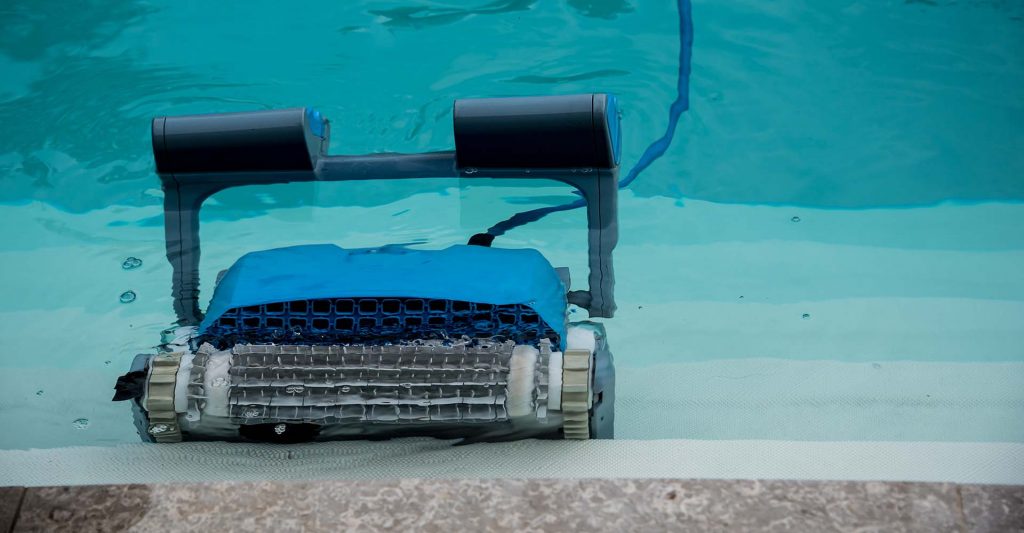How Do You Clean A Fibreglass Pool?
Fibreglass pools are easier to clean than concrete or vinyl swimming pools, however they still need regular cleaning and upkeep. Pool maintenance is important for the safety of swimmers and the longevity of the pool. Pool water is susceptible to dust, debris, leaves, algae, oil, and cosmetics from the swimmer’s bodies. You can create a cleaning timetable and keep an eye on the chemical balance regularly, then your fibreglass swimming pool should stay clean and healthy year-round. If maintaining your pool is not something you want to be responsible for, you can always hire a professional pool cleaner to maintain and service your pool!

4 Tips To Cleaning And Maintaining Your Fibreglass Pool
Fibreglass pools are easier to clean than concrete or vinyl swimming pools, however they still need regular cleaning and upkeep. Pool maintenance is important for the safety of swimmers and the longevity of the pool. Pool water is susceptible to dust, debris, leaves, algae, oil, and cosmetics from the swimmer’s bodies. You can create a cleaning timetable and keep an eye on the chemical balance regularly, then your fibreglass swimming pool should stay clean and healthy year-round. If maintaining your pool is not something you want to be responsible for, you can always hire a professional pool cleaner to maintain and service your pool.
1. Prevention Is Better Than A Cure: Invest In A Pool Cover
The best way to prevent your pool water from getting contaminated is by using pool cover. This will ensure that your pool is free from leaves and other debris, and decrease the maintenance when you are not using your pool. It can also benefit with heating too.
2. Clean Debris From Your Pool Regularly
An unclean pool is unattractive, plus and not very healthy to swim in! To keep your swimming pool clean, it’s essential to have a regular cleaning schedule. Even if your pool is located in a position with no trees or plants surrounding it, you still might notice you are finding leaves, insects and other debris floating around your pool. The chances of finding these in your pool if there are lots of trees and plants nearby, will be even higher. There are many different pool cleaning options, the good news is pool leaf scoops (which have a long telescope handle) are relatively cheap to purchase. This will allow you to remove debris from anywhere in your pool. Further to leaf scoop there are some other options around cleaning your pool:

Manual Pool Cleaning
If you plan to clean your pool manually, as mentioned above, you will need equipment like a telescopic pole long enough to reach your pool’s walls and floor. You will have to attach a skimmer net to the telescopic pole so that it can trap any floating leaves or debris. A pool brush can also be attached to the pole to scrub away dirt from the walls and floor of the pool. Make sure you always use a nylon-bristle soft brush to clean fibreglass pools. Manual cleaning will require some time and labour on your part. However, because fibreglass pools are not prone to attracting dirt and algae, cleaning a fibreglass pool is a relatively gentle activity which does not involve harsh brushing or strong chemicals. (Never use steel brushes, as it will damage the walls of the fibreglass pools.) You can also have a manual pool vacuum with a hose and sufficient length to cover all areas of a pool. This is required to clean dirt from the surface of the pool. The vacuum head of your pool vacuum cleaner should be capable of being attached to the telescopic pole.
Automatic Pool Cleaning
If the thought of manual cleaning scares you or if your pool is large you can invest in automatic cleaning equipment. While automatic pool cleaning equipment is slightly expensive, the investment will save you time and effort in the long run. Some automatic pool cleaning equipment you can look into are:
Suction Side Cleaner:
- Hooked to your skimmer
- Move around the pool floor collecting dirt and debris
- Some types of cleaners can also clean the walls of your pool
- Economical and easy to run
- Easily cleaned and maintained
- Be mindful that their working depends on the pool pump, so they can increase the load on your pool filter
Pressure Side Cleaners:
- Cost more than the suction side cleaners
- More effective at picking up debris and cleaning the pool
- Hooked to the opposite end of the pool filtration system
- Propelled by the force of the water from the return jets
- Contains a filter bag to collect dirt and debris
- This equipment is available in different types, so you will need to select a model suitable for your pool
Robotic Pool Cleaners:
- Sophisticated robotic pool cleaners run on electricity
- Long cords and they run on low voltage
- Brush and vacuum attached, and do their scrubbing and cleaning independently without depending on your filtration system
- However, they do require regular cleaning and maintenance to function effectively

3. Filter And Water Quality
Every pool needs a quality filter pump to maintain the water quality, so it is clean to swim in. A pool pump generally runs for 6-8 hours a day for saltwater and slightly longer for chlorine. By running the pump during the day, you will avoid any imbalances in your water, and it will stay nice and clean, ready to use at your leisure. An important factor to maintaining your swimming pool’s water quality is the pH level. Ideally, the pH of your pool should be between 7.2 and 7.6. The alkaline levels should be around 80 to 120 parts per million (PPM) and the chlorine just under 3.0 PPM. It is a good idea to have these chemicals so you can add them when necessary to adjust the levels of your pool water. Check out our other blog articles, or give our friendly team at Barrier Reef Pools a call and we can help with any queries about your water testing and your filter and pump setup. View our Saltwater pools maintenance guide!
4. Keep An Eye Out For Stains
Testing the swimming pool water regularly and adding the necessary chemicals can help your swimming pool remain stain free. However even if your water has the correct levels of chemicals- your swimming pool is still vulnerable to stains from organic and non-organic sources. These stains can be removed by applying commercial pool ‘tile’ cleaners. However, make sure to purchase products suited to a fibreglass pool. The first option would be to try a sponge and detergent mixed with water. Because these stains are generally caused by high concentrations of metal, it is important to know which kind of metal is staining your pool before you try to treat it. Different types of metals leave different coloured stains. For instance, high levels of magnesium will result in grey stains, iron causes a maroon coloured stain and copper leaves a blue-green stain. Your pool is also susceptible to organic stains caused by things such as leaves, dirt and algae. These stains are generally green and brown in colour.
Our experienced team can provide further education on cleaning and removing stains in your fibreglass pool, so please give us a call at Barrier Reef Pools so we can help!

